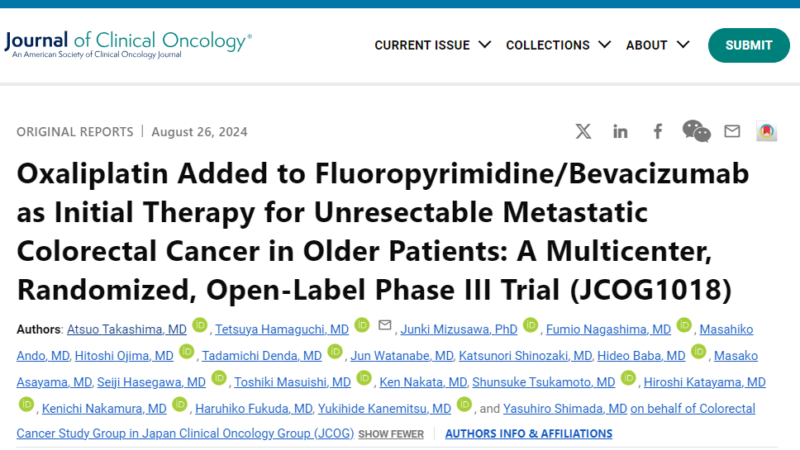Piotr Wysocki recently shared on LinkedIn:
“A recent phase III clinical trial published in the Journal of Clinical Oncology has evaluated the effectiveness of adding oxaliplatin (OX) to the standard chemotherapy regimen of fluoropyrimidine (FP) and bevacizumab (BEV) in older patients with unresectable metastatic colorectal cancer (MCRC). The trial was conducted across 42 institutions in Japan to determine whether this combination therapy would improve outcomes in this patient demographic.
The trial included 251 patients aged 70 and older randomly assigned to receive either the standard FP + BEV therapy or an enhanced regimen that also included OX. In the intention-to-treat population, 125 patients were assigned to the FP + BEV arm (71 patients received 5-FU/l-LV, 54 patients received CAPECITABINE), and 126 patients were assigned to the FP + BEV + OX arm (67 received FOLFOX, 59 received CAPOX) The study’s primary endpoint was progression-free survival (PFS), with secondary endpoints including overall survival and the incidence of adverse effects.
Results indicated a slight increase in median PFS in the group receiving OX (10.0 months) compared to the group without OX (9.4 months). The hazard ratio (HR) for PFS was 0.84 (90.5% CI, 0.67 to 1.04), with a p-value of 0.086, indicating no statistically significant difference. Furthermore, the median overall survival was slightly lower in the OX group (19.7 months) compared to the standard treatment group (21.3 months), with an HR of 1.05 (95% CI, 0.81 to 1.37). Notably, the addition of OX led to a higher incidence of severe adverse events (69% vs. 52%), including three treatment-related deaths in the OX group compared to one in the standard treatment group.
The study demonstrated that optimal treatment in 1st line settings in elderly advanced CRC patients should not contain oxaliplatin. However, in clinical practice in Europe, oxaliplatin-based chemotherapy is rarely used in 1st line settings due to its toxicity. In my clinical practice, elderly patietns often start with a fluoropirimidine+bevacizumab combination, which, in the case of good tolerance, is expanded to FOLFIRI+bevacizumab after 1-2 cycles.”
Authors: Atsuo Takashima, Tetsuya Hamaguchi, Junki Mizusawa, Fumio Nagashima, Masahiko Ando, Hitoshi Ojima, Tadamichi Denda, Jun Watanabe, Katsunori Shinozaki, Hideo Baba, Masako Asayama, Seiji Hasegawa, Toshiki Masuishi, Ken Nakata, Shunsuke Tsukamoto, Hiroshi Katayama, Kenichi Nakamura, Haruhiko Fukuda, Yukihide Kanemitsu, Yasuhiro Shimada.

Source: Piotr Wysocki/LinkedIn
About Piotr Wysocki
Piotr Wysocki leads the Clinical Oncology Department at University Hospital and the Faculty of Oncology at Jagiellonian University-Medical College in Krakow, Poland. As an advisor to the Polish Ministry of Health, he shapes the national cancer strategy.
His clinical expertise spans the systemic treatment of breast, gynecologic, and genitourinary cancers, with a focus on developing innovative metronomic chemotherapy-based therapies for advanced cancer patients who have undergone prior treatment.
Read other posts by Piotr Wysocki published on OncoDaily.


